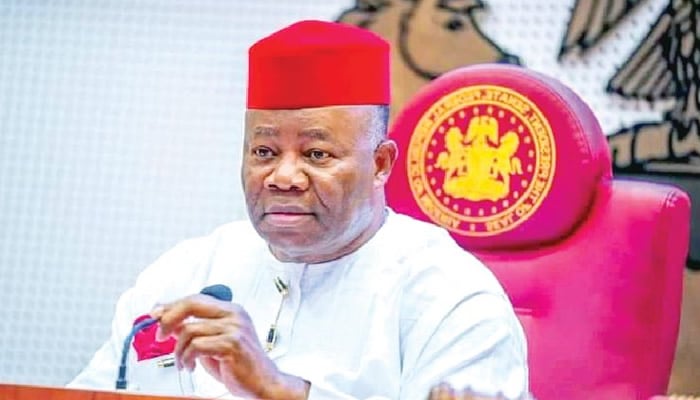


Claim: Speaking during a plenary session at the Red Chamber on Tuesday, Senate President Godswill Akpabio announced that the newly approved minimum wage applies to all workers across both public and private sectors, including maids and other domestic staff.
He said, “If you are a tailor and you employ additional hands, you cannot pay them below N70,000. If you are a mother with a newborn child and you want to hire a housemaid to look after your child, you cannot pay the person below the approved minimum wage. It is not a maximum wage. It applies to all and sundry. If you hire a driver or gateman, you cannot pay them below N70,000. So, I’m very delighted that this has been passed, and we now look forward to employers of labour improving on what has been set as a benchmark for all to follow.”
Findings
The Senate passed the 2024 National Minimum Wage Amendment Act Bill after President Bola Tinubu transmitted the new wage bill to both chambers of the National Assembly, seeking expeditious support from the lawmakers for its passage.
The new bill replaces the National Minimum Wage Act, No. 8, 2019, which approved a N30,000 minimum wage with five years to negotiate a new wage.
The 2024 wage review pegged the new minimum wage at N70,000 and reduced the number of years for the next minimum wage negotiations to three years.
While leading a debate on the bill, the Majority Leader of the Senate, Opeyemi Bamidele, said N70,000 was agreed upon by all the parties after negotiations as “part of the Federal Government’s short-term measure to mitigate the situation in the country.”
However, both the 2024 National Minimum Wage Amendment Act Bill and the National Minimum Wage Act of 2019 did not include domestic workers in the payment of the monthly minimum wage for employees in the country.
Section 3(1) of the 2019 Act states that “Every employer shall pay a national minimum wage of not less than N30,000 per month to every worker under his establishment, except as otherwise provided under this Act,” while Section 4(1) of the Act states that, “Section 3(1) does not apply to establishments in which workers are employed or paid on a part-time basis and commission or piece rate, an establishment employing less than 25 persons, workers in seasonal employment like agriculture, and any person employed in a vessel or aircraft to which the laws regulating merchant shipping or civil aviation apply.”
Meanwhile, the explanatory memorandum of the 2024 minimum wage amendment bill showed that the 2019 National Minimum Wage Act was amended with the insertion of only two new sections 3(1) and 3(4). Both were silent on domestic workers.
Similarly, the Information System on International Labour Standards on the ILO website revealed that the Domestic Workers Convention No. 189, which clearly stipulates that domestic workers should be included in the payment of the national minimum wage in every country, is part of the 49 conventions of the global labour body that have not been adopted by Nigeria.
Chapter 8 of the ILO Minimum Wage Policy Guide said, “Domestic workers are amongst the lowest paid and often among the most informal group of wage employees. They are also frequently excluded from minimum wage protection. An estimated 21.5 million domestic workers have no minimum wage that is applicable to them, although they exist for other workers. Among those who are covered, many are entitled to a rate that is lower than the minimum wage for other workers.”
A lawyer and founder of Nigerian Regulations, a newsletter that tracks legislative, regulatory and policy developments in Nigeria, Jesutooni Ajiboye, said the Senate President’s claim was inaccurate.
He explained, “Section 4 of the extant National Minimum Wage Act, 2019 is clear about exemptions which include establishments with less than 25 workers, or where workers are employed on a part-time basis, among others. Essentially, employers of labour with less than 25 employees are not bound by the Minimum Wage Act. Suffice it to mention that even the current bill, which has been transmitted to the President for signing did not amend the position under the 2019 Act, and the exemptions still apply under the 2024 Minimum Wage Bill.”
The Head of Public Affairs of the Nigerian Labour Congress, Benson Upah, said, “Inasmuch as we want every worker to be captured, the making of the law at the moment excludes certain categories of workers. But if the number of workers is up to 25, of course, they automatically belong to the minimum wage bracket.”
Verdict: The Senate President’s claim is false